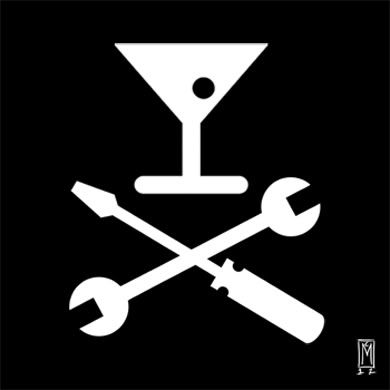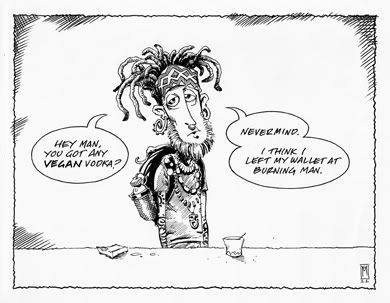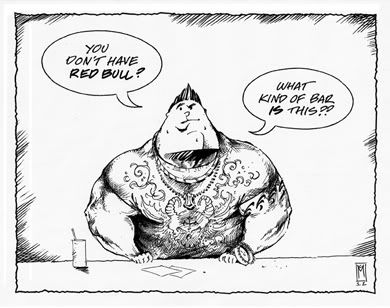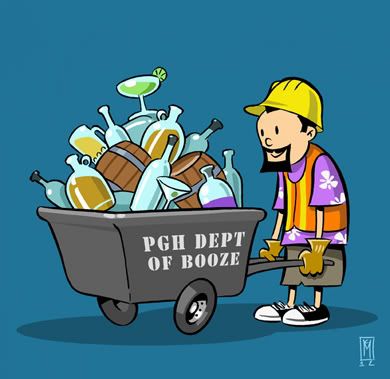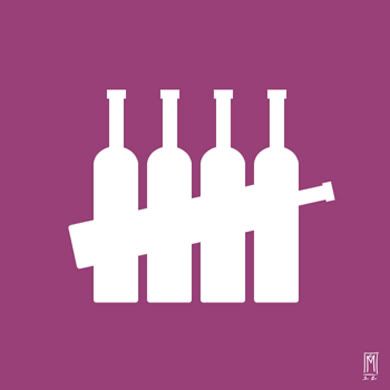Wednesday, October 10, 2012
Pack & Pour: A Guide to Nomadic Bartending
If you enjoy making cocktails (and if you're one of the five people who read this blog, then it's a safe bet you do), sooner or later someone will ask you to bartend at a party, cookout, tailgate, or other similar gathering. Providing adult refreshment at these kinds of events can be a lot of fun, especially if you're asked to make cocktails from scratch. We're not talking about just needing someone to pop open beers or crack a few wine bottles ... we're talking events where you'll actually be mixing drinks and need the equipment necessary to do so.
A big issue with making drinks somewhere other than your usual spot is trying to figure out what you'll need to bring with you in order to pull it off. Some places may have a fully-equipped bar, and all you'll need to bring are your smile and your know-how. Other places will require you to essentially bring an entire bar with you. It all depends on the event. Ideally, the organizer(s) will be supplying the booze, mixers, garnishes, and other stuff that's going in the drinks, but you'll probably need to provide at least some of the other necessities.
Aside from obvious items like shakers, strainers, bar spoons, etc., what other miscellaneous stuff should you bring when you're mixing away from home? I've bartended at several events big and small, casual and formal, and I quickly learned to operate under the following rule:
Assume the place you're working won't have what you need.
If someone tells you they'll have something you'll need, bring it with you anyway. Never count on your host to provide important equipment. Even the most organized, detail-oriented person can forget things or miscommunicate, so cover your bases, anticipate what you'll need, and bring it yourself (Even if they do have it, it never hurts to have extra).
The list below is not exhaustive, but just offers up a few things I've found handy. I don't bring everything with me every time, but I've used each of them at one time or another and was glad I had it.
Drink Recipes
Depending on what you're serving, you'll likely want to have a few recipes jotted down. Whether you're preparing traditional favorites or a selection of original recipes, write 'em down somewhere. Bring a little notebook, a pile of Post-its, or something you can easily refer to when it's time to start pouring.
Ice
"They said they'll have ice."
People say a lot of things.
I once worked an event where I was assured I'd have all the ice I'd need because the place had an ice machine. When I arrived, I discovered the machine was extremely small and had already been thoroughly emptied of its contents by the many other vendors working the event. Since then, I always bring a bag or two with me. That ensures I can get started making drinks while the hosts/organizers go scrounge up more ice.
Water
It sounds silly, but when you're somewhere without easy access to water (like the middle of a stadium parking lot) washing your barware becomes a problem. Bring a gallon or two with you if a convenient water source looks unlikely.
Ice Scoop
Much classier than using your hands or a keg cup.
5-Gallon Bucket
There's nothing like the feeling of making the first drink of the evening ... and realizing there's nowhere to dump out your shaker. 5-gallon buckets work great as portable sinks. I always bring at least two, using one as a dump sink and the others to clean barware in.
Cooler/Ice Chest
As the name suggests, this is where you put your ice. Also handy for storage and carrying stuff in and out of the venue. Basically, they're insulated steamer trunks. And just like your 5-gallon buckets, you can use them as makeshift sinks.
Bar/Side Towels
Always, always, always bring these- they'll be one of the very first things you reach for, and in all likelihood the venue won't provide them. I bring a dozen or so. You'll need them to clean up spills, dry off barware, and a bunch of other stuff. You can usually find them in bulk at restaurant supply stores, so grab a pack or two before you head out.
OXO Mini-measure
Their easy-to-read markings and pour-friendly shape make these little guys a favorite of many professional and home bartenders. I use standard jiggers, but I usually bring one of these along as a backup or in case a non-bartending-type guest wants to help out.
Pourers
These are the little nozzles you see in the tops of bottles at pretty much every bar. You can get by without them, but they definitely make pouring faster and easier. Get them from restaurant supply stores or online barware vendors and throw a handful into your bag.
Openers
Even if you're mainly serving cocktails, always have something to open wine and beer bottles with.
Multi-tool
Not mandatory, but useful as hell. Having some combination of pliers, knife, screwdrivers etc. in one convenient package can be a lifesaver. There are expensive ones and cheap ones, so buy according to your budget and preferences. I like the Leatherman Wave (which I have with me every time I bartend, no matter where), but there's a bunch of good options out there.
Duct Tape
Self-explanatory. It fixes everything.
Swing-top Bottles
If you're bringing any of your own liquid ingredients (juices, syrups, etc.) invest in a few of these. They're not expensive, and they pay for themselves in not having to keep track of a bunch of little caps all night long.
Energy Bars
Because you might get hungry ... and they might not have food for you.
Serrated Knife
Serrated knives do a better job than straight-edged knives at cutting fruit like limes, lemons or anything with a rind or a thick peel. Since it's likely that's exactly the kind of stuff you'll be dealing with, bring a knife you're comfortable with. I like the cheap ones that come with their own sheath like this one because I can just chuck them in my bag and not worry about them punching holes in stuff or people.
Small Cutting Board
Bring this along so your knife doesn't get lonely. It also prevents disapproving looks from your host when he notices you slicing lime wedges on top of his Xbox.
Channel Knife/Vegetable Peeler
Handy for making spiffy-looking garnishes, if you're a spiffy garnish kind of person.
Folding Table
I know it sounds strange to bring your own work surface with you, but anyone who has ever had to make a ton of drinks on a cramped kitchen counter or wobbly patio table can attest to how frustrating an experience it can be. For those (like me) who don't happen to own one of those high-end portable bars, I suggest using a folding table like this.
I was fortunate enough to have a couple of these donated to me by a neighbor who was moving, and they're great. The only drawbacks are their size and weight. They don't fit in smaller cars and can be unwieldy for one person to carry. However, there are similar models that fold up to smaller size and come with a handle so you can carry 'em around like a suitcase.
Stuff to Write With
I like to bring a ballpoint pen, a Sharpie, and a few sheets of paper with me. I use them mainly to write up on-the-spot menus, because everyone (and I mean EVERYONE) will ask you what drinks you have on offer. Writing up a quick sign with the drink names and ingredients will save you having to recite the particulars of your drink list over and over every time someone steps to the bar.
Oh, and I use ballpoint pens and Sharpies specifically because their ink isn't water-soluble. Remember that everything in a bar will get wet at some point, including your carefully-written menu.
Small Funnel
You won't realize you need it until it's too late.
Measuring Cup
Useful mainly if you're making batches of something like punch or sangria. Get a 2 or 4-cup size (unless you enjoy measuring out a bowl of punch 2 ounces at a time).
Ice Crusher/Lewis Bag & Mallet
Not necessary unless you know you're going to be making things like juleps, swizzles, and tiki drinks. I prefer the mechanical hand-cranked type over the bag & mallet, but both work fine.
First Aid Kit
I'm not talking an EMT-grade extravaganza with aspirin, burn cream, antiseptic, 15 different sizes of bandages, and all the other goodies. My first-aid kit is an Altoids tin full of band-aids and the roll of duct tape mentioned above. Basically, just bring something to keep from bleeding into people's drinks when you cut yourself (and you will cut yourself, eventually).
Plastic Grocery Bags
Toss a few of these in your kit. They're great for packing up wet/sticky stuff at the end of the night. Again, like duct tape and 5 -gallon buckets, they're a cheap, simple item with lots of uses.
Business Cards
If you find it pleasurable to make drinks for strangers, have something with your contact info on it you can give them. Assuming you've done your job somewhat competently, it's entirely possible someone will ask you to make drinks again at a future event. Make it easy for them.
One last tip: I don't recommend bringing particularly expensive or valuable equipment on the road if you can manage it. As tempting as it may be to show off your Uncle Herbert's one-of-a-kind antique cocktail shaker, you'll probably want to leave it at home unless you're OK with family heirlooms being lost, broken, or stolen.
Friday, September 21, 2012
Oregon Daiquiri
Oregon Daiquiri
2 oz. White rum
3/4 oz. Lime juice
1/2 oz. Hazelnut syrup
2 dashes Bittermen's Xocolatl Mole bitters
Shake everything with ice and strain into chilled cocktail glass.
The Oregon Daiquiri is a drink I came up with a while back. I wish I had some grandiose story of how I drew inspiration from a variety of sources, labored for days on the concept, and tweaked the recipe incessantly in the pursuit of the perfect drink. But that's not what happened. What went down is more or less:
1) A brand rep kindly sent me a bottle of rum (In this case, Banks 5 Island)
2) I had hazelnut syrup handy and wanted to see if it would taste good with the rum.
3) I added some lime juice and realized what I'd made is essentially a Daiquiri.
Welcome to mixology, kids. Sometimes that's all there is to it.
Back to the Daiquiri. The Daiquiri is a classic cocktail, and like many of the classics, it uses few ingredients to achieve superb results. Like I often do, I'll avoid going into the history and various incarnations of this drink, since lots of other booze geeks have worked very hard researching and publishing this information elsewhere. All that's really important to know is you should use good rum, fresh juice, and mix it properly.
In other words, don't screw up a simple, easy-to-make, delicious classic drink. Prominent bottle jockey Jeffrey Morgenthaler felt so strongly about this he recently made a video titled "How to Not F@%& Up a Daiquiri". It should be required viewing for anyone who thinks the ideal Daiquiri is pink and comes out of a machine with whirly parts.
Of course, not everyone loves a Daiquiri. On the other side of the fence is Bernard DeVoto, acclaimed author and historian who left no doubt as to his feelings on the Daiquiri in his cocktail manifesto The Hour:
"Now, bathtub gin was not a good liquor- though, gentlemen, there have been worse and still are. But it was not bathtub gin that came close to destroying the American stomach , nervous system, and aspiration to toward a subtler life. Not the gin but the fruit juices so basely mixed with it: all pestilential, all gangrenous, and all vile. A cocktail does not contain fruit juice.
In that sudden roar the word you make out is 'Daiquiri.' Yes, yes, I know. I have alluded to rum before, we must not deny that it exists and is drunk, and as a historian I must give it its due. It gave us political freedom and Negro slavery. It got ships built and sailed, forests felled, iron smelted and commercial freight carried from place to place by men who, if their primordial capitalist bosses had not given them rum would have done something to get their wages raised. In both cheapness and effectiveness it proved the best liquor for Indian traders to debauch their customers with. People without taste buds can enjoy it now, though the head that follows it is enormous, and such sentimentalists as the seadogs of small sailing craft can believe they do. But mainly it is drunk as all sweet liquors are, in a regressive fantasy, a sad hope of regaining childhood's joy at the soda fountain. No believer could drink it straight or gentled at the fastidious and hopeful hour. No one should drink it with a corrosive added, which is the formula of the Daiquiri."
A pretty harsh assessment, but given that there were only two drinks DeVoto considered worth consuming (the Martini and a belt of straight American whiskey), the Daiquiri didn't stand much of a chance. He also utterly loathed rum (and took a dim view of those who drank it), so that didn't help matters either.
But it's a great drink nonetheless. If you want to make the one shown above, white rum is pretty easy to come by, but make sure you get a relatively good one. Limes shouldn't be hard to track down, so don't cut corners- get your juice straight from the fruit! As for hazelnut syrup, I used Torani, since that's what I happened to have at the moment. Another choice is B.G. Reynolds hazelnut orgeat (and I'm not recommending them just because I drew the label art...it's good stuff). And you always have the option of smashing up a bunch of hazelnuts and making your own syrup ... if you're one of those make-your-own-ingredients kinda people.
Lastly, the Xocolatl Mole bitters are a tasty little ingredient with tons of uses. They can be found online at many places including Cocktail Kingdom, Boston Shaker, and Kegworks.
Oh, and I called it the Oregon Daiquiri because although I've never been to Oregon, I know several nice people who live there and they tell me that hazelnuts are a big deal out there. Again, sometimes that's all there is to it.
Friday, June 8, 2012
Thursday, June 7, 2012
Wednesday, May 23, 2012
Locals Only
As I mentioned earlier, anyone who says you can't get a good drink in Pittsburgh simply isn't looking. In the last 2 -3 years there have been a number of great restaurants and bars in the 'Burgh that have put serious cocktail programs in place. So if it's been a while since your last tour of Pittsburgh's eateries and watering holes, it's time to take another peek and see what's out there.
However, we're not just serving great booze here in Pittsburgh ... we're also making it. In addition to some folks who make award-winning vodka, we've got a brand-spankin' new whiskey distiller. Located right outside downtown in the Strip District, Wigle Whiskey is currently turning out great un-aged rye and wheat whiskey, both of which are stocked by several of Pittsburgh's best eating & drinking joints.
Cocktail scholars and booze geeks alike know that Southwest Pennsylvania was ground zero for the Whiskey Rebellion, and Wigle takes its name from one notable participant (for the full story, visit the distillery and take the tour ... it's well worth it). In fact, whiskey production was once so widespread in Southwest PA that rye was frequently referred to as "Monongahela Rye" for the number of distilleries in the region surrounding one of Pittsburgh's three rivers. Thanks to Wigle, whiskey is once again being produced in our area.
As part of their plan to reintroduce Pittsburghers to their native spirit, the kind people at Wigle host monthly cocktail-making classes, and they recently asked me to swing by and pass along a few tips on how to make decent drinks. They also asked me to come up with an original cocktail using one of their whiskies, so my contribution for the evening was ...
Veranda
2 oz. Wigle wheat whiskey
1 oz. Basil & black pepper syrup
.75 oz. Fresh lemon juice
Shake everything with ice and strain into chilled cocktail glass. Garnish with a basil leaf.
Basil & black pepper syrup:
1.5 cups demerara sugar
1 cup water
12-14 basil leaves, torn
2 tsps. freshly-ground black pepper
Combine everything in a saucepan over low/medium heat and stir until sugar is dissolved (do not boil). Cover and let sit for 1 hour. Strain out the solids and refrigerate.
I waved this drink under the noses of the powers-that-be at Verde and they liked it enough to put it on the menu (If I haven't mentioned it already, the fine folks at Verde allow me behind the bar a few times a week to make drinks for people and otherwise molest their liquor supply. They're brave souls.)
So if you're somewhere in the general Pittsburgh area, swing by and grab an adult beverage.* And if you prefer the sudsy stuff, Verde also features locally-made beer from East End Brewing, Pennsylvania Brewing, and cider from Arsenal Cider House & Wine Cellar.
*Get some food too. It's really good.
Wednesday, March 7, 2012
What I've Learned: Year Five
It looks like another year has slipped by while I was busy killing brain cells and writing about it here. However, the cells that remain managed to hold onto a few things, which I present below in convenient list format...
What I've Learned in my Fifth Year of Boozeblogging
~ Bartending is really peopletending.
~ I don't particularly care which celebrity was spotted drinking a particular brand of vodka on some red carpet somewhere...but it's nice of all those liquor brand reps to email me about it anyway.
~ If you see a bottle of Chartreuse in a bar, rest assured that at least a third of it will be consumed by the staff.
~ Stuff like Twitter and Facebook are a fun way to keep in touch, but hanging out with your booze nerd buddies in person beats it hands down. (I actually learned this several years ago, but it bears repeating)
~ I drink Red Stag the way Cookie Monster eats cookies.
~ You can make a shot luge out of tofu.
~ If you set up a makeshift office in the Hotel Monteleone lobby, passersby will give you free samples of liquor. (Note: this may only apply during Tales of the Cocktail)
~ There is a real old-school thrill to buying locally-brewed beer in returnable bottles.
~ When people discover you write about cocktails, they will do things like describe in only the vaguest terms a drink they once had in 1994 at a dive bar in rural Ohio and expect you to immediately tell them its name and complete ingredient list.
~ People sitting three feet away from of a row of taps will ask, "What do you have on draft?"
~ Martin Cate recently commented that he doesn't drink out of pineapples at home ... but I'm not sure I believe him.
~ There is no shame in being on a first-name basis with the staff at your local liquor store.
~ Likewise, there is no shame in your 4-year-old son being on a first-name basis with the staff at your local liquor store.
~ How many bitters do I need? ALL OF THEM.
~ Rumors of the PLCB's imminent demise emerge every few years like clockwork. I'm not holding my breath.
~ Pittsburgh's cocktail scene continues to thrive and expand. If you claim there is nowhere to get a good drink in the 'Burgh, you simply aren't looking.
~ Still no consensus on how "orgeat" is pronounced.
~ I told a person from Australia where the good bars in Seattle and Portland are. I've never met the Australian person, and I've never been to Portland or Seattle. The only conclusion I can draw from this is that the internet was designed to help people drink more efficiently.
~ It appears not nearly as many people hate gin as they did five years ago.
~ Amari are the booze nerd equivalent of Pokémon.
~ You can never go wrong packaging alcohol in a skull-shaped container.
~ When I make them for myself, I violate almost every rule regarding the proper construction of a Martini.
~ If you own an ice crusher, it's a pretty good bet we can be pals.
~ It's not a bad deal having both a vodka and a whiskey distillery a short drive from your home.
~ For the fifth year running, I have to say that my fellow boozebloggers are some of the most friendly, generous, and all-around fun people I know. There's a hell of a lot more of them now than there were 5 years ago, and I hope they'll all still be around next year.
Subscribe to:
Posts (Atom)

